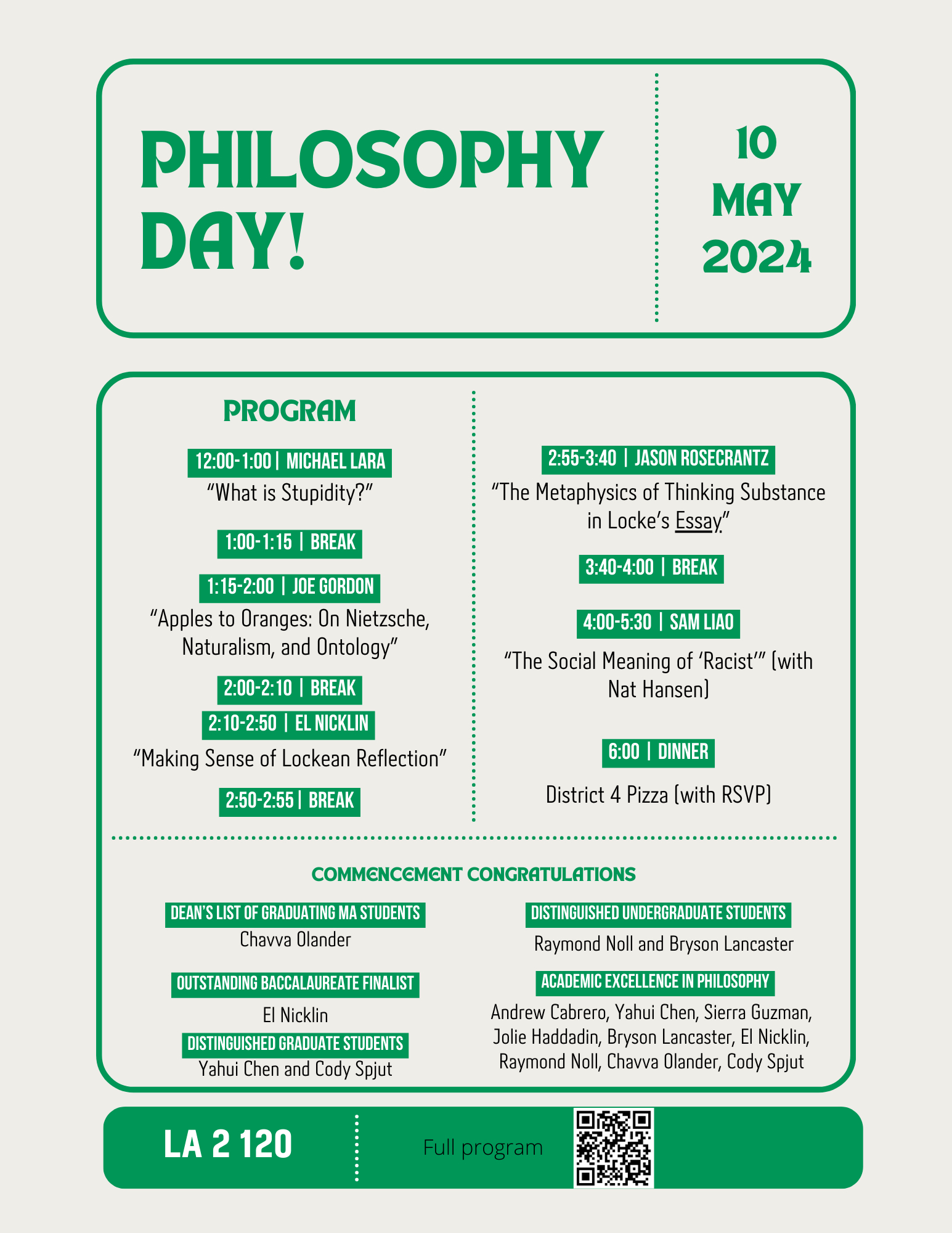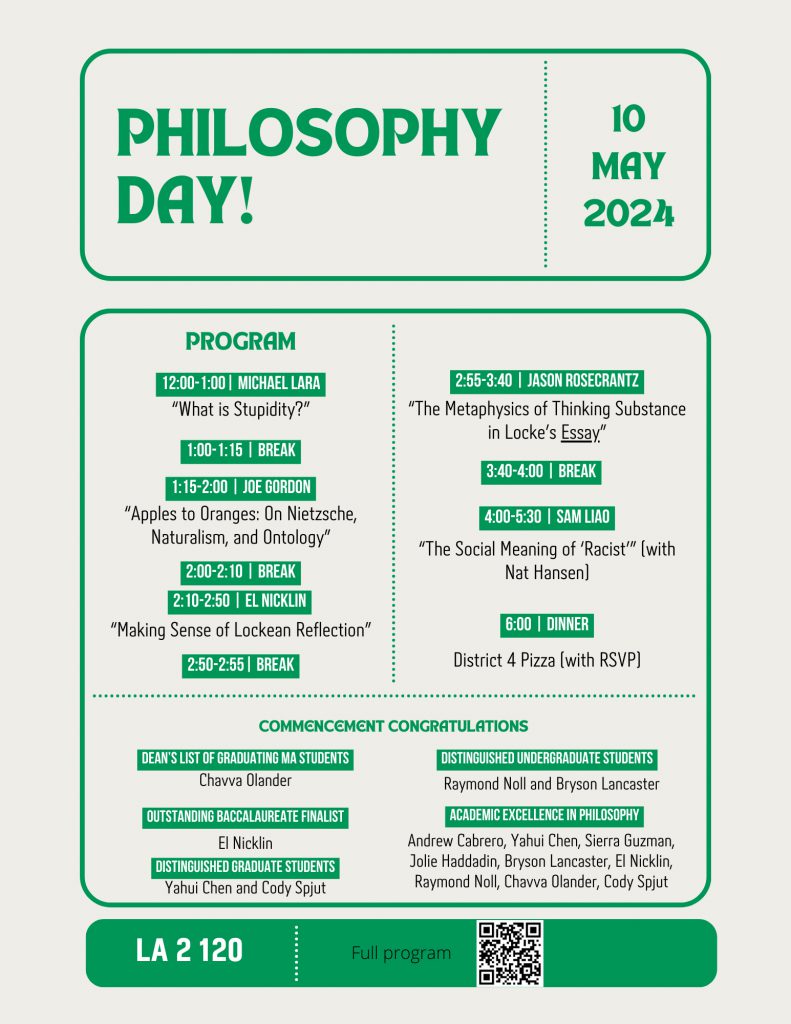
- This event has passed.
Philosophy Day! Symposium SP24
May 10 @ 12:00 pm - 5:30 pm
It’s the end of another successful academic year! Please join us for some endterm socializing and solidarity at the biannual Philosophy Day! symposium, which will be held on Friday May 10th from 12:00pm–5:30pm in room LA2–120. If you would like to attend the dinner afterwards, please RSVP in advance with organizers Marie Jayasekera or Nellie Wieland.
Program:
12:00pm: Opening Remarks
‘What is stupidity?’
- Abstract: This talk offers a novel Rylean view of stupidity, wherein stupidity is defined as a conspicuous and difficult-to-rationalize gap between expected skillful performances in context and the actual performances which occur. In offering this definition, I argue that ‘stupidity’ is a certain failure of performance as opposed to an epistemic shortcoming. Historically, philosophers have considered stupidity to be a special privation of knowledge or a deficiency in what one knows. Kant, for example, suggests that stupidity is a failure in one’s power of determinative judgment. Others suggest that stupidity is a failure of one’s power of reflective judgment or even one’s failure to respect epistemic norms of their time. My Rylean proposal is developed to account for a wide range of cases which cannot be explained by epistemic accounts while also offering an explanation as to what may be plausible about them.
1:00pm–1:15pm: Short Break / Spillover Q&A
- Abstract: Within Nietzsche studies, a standard interpretation of Nietzsche is that he did not hold metaphysical commitments because he was a naturalist. For instance, Ansell-Pearson & Bamford contend that Nietzsche’s naturalist approach to inquiry stands in place of a metaphysical system. Specifically, they claim that Nietzsche provided an ‘anti-metaphysical’ approach to inquiry in a campaign to undermine the foundations of ‘customary’ morality and to build a new moral code based on ethical naturalism. They also interpret Nietzsche as suggesting that the necessary reconstruction will be inspired by the sciences of physiology, medicine, sociology, and solitude (p. 4). Accordingly, this experimental worldview, which uses ‘a multiplicity of faculties, methods, and procedures’ (p. 124), is a key aspect of Nietzsche’s approach to inquiry and a foundational feature of Nietzsche’s thought. I attempt to show that Nietzsche’s reliance upon the physical sciences to undercut Christian metaphysics—a naturalist approach to inquiry—did not preclude his metaphysical and ontological commitments. After clarifying what is meant by ‘naturalism’ and ‘ontology’, and their relations to Nietzsche’s thought, I will show that naturalist inquiry into the physical world is perfectly compatible with metaphysical theorizing. After examining key aphorisms in Nietzsche’s 1881 work, Dawn, I will reject the claim that Nietzsche is an ‘anti-metaphysical’ thinker on the grounds of his ontological commitments displayed in these passages.
2:00pm–2:10pm: Shorter Break / Spillover Q&A
‘Making sense of Lockean reflection’
- Abstract: Locke’s notion of reflection is integral to his philosophy of mind and theory of ideas, and yet this faculty is underrepresented in the secondary literature. In writings about Lockean reflection, key features are disputed. This reconstructive account of Lockean reflection attempts to resolve unclarities in regards to the following questions: What are the steps of reflection? Does Locke understand reflection to be a voluntary faculty? Can children reflect? Ultimately, I show the process of reflection involves both voluntary and involuntary steps. I also emphasize Locke’s notion of contemplation as a faculty that follows reflection to form lasting, clear and distinct ideas.
2:50pm–2:55pm: Very Short Break
‘The metaphysics of thinking substance in Locke’s Essay‘
- Abstract: In IV.iii.6 of his Essay, Locke wrote that he sees ‘no contradiction in it, that the first eternal thinking being, should, if he pleased, give to certain systems of created senseless matter, put together as he sees fit, some degrees of sense, perception, and thought’. This thinking-matter hypothesis, insofar as it admits of degrees of mentality that accommodates non-human animal minds, is in sharp contrast to the stark Cartesian dualism according to which non-human animals are mindless machines. But how is this hypothesis to be understood, metaphysically speaking, and what did Locke commit himself to in proposing it? Locke characterized the divine act by which matter might be given thought as ‘superaddition’. Is that which is superadded to matter to be understood as material or immaterial? In the secondary literature, Locke has been interpreted in both ways. While all interpreters acknowledge that he was explicitly agnostic about the real essence of substances, many attribute to him an implicit preference for metaphysical physicalism or dualism about minds. Jolley (2010, 2015) and Downing (2015) both argue that the thinking matter hypothesis reveals Locke’s sympathies for a metaphysical materialism about finite minds, while Duncan (2021, 2022) argues that Locke’s commitment to an immaterial God and a hierarchy of perfections commits him to metaphysical dualism about at least some of the more complex minds. Kim (2008, 2010, 2016) diagnoses this diversity of interpretation as a result of a failure to recognize the extent of Locke’s nominalism; such interpretations ‘confuse what is nominal with what is real’ (Kim: 2008, 445). In this presentation, I will briefly present these competing interpretations of Locke’s metaphysics of mind, and defend Kim’s ‘austere nominalist’ interpretation against the some of the more pressing crypto-materialist and crypto-dualist challenges.
3:40pm–4:00pm: Break / Socializing
‘The social meaning of racist‘
- Abstract: Theorists and pundits across the political spectrum have claimed that certain terms have undergone conceptual inflation. For example, Blum (2002: 31) is concerned about the term racist being conceptually inflated—’losing [its] moral force’ due to ‘overexpansive usage’. Like most other critics of conceptual inflation, Blum’s concerns about the conceptual inflation of racist appear to be supported by his own informal observations. We distinguish two concerns about conceptual inflation that are usually taken to be inversely correlated—intensity bleaching (‘losing moral force’) and extension expansion (‘overexpansive usage’)—and empirically assess, across two studies, whether racist has, in fact, undergone conceptual inflation.
6:00pm–8:00pm: Reception and Dinner
Speakers and participants invited! [If you would like to attend the dinner afterwards, please let organizers Marie Jayasekera or Nellie Wieland know aforehand so that they have an accurate headcount.]
Come join us and celebrate the many successes that our department has enjoyed this year. For example, Chavva Olander was lauded with a spot on the OGS Dean’s list, which is awarded to at most 1% of graduating MA students; Manuel Rojas was awarded the OGS Fellowship for AY23–24; and Cody Spjut received one of the AY23–24 Sally Casanova Predoctoral Fellowships. Travis Barnett took first place at CSULB’s 36th annual student research competition. Congratulations also to the AY23–24 scholarship winners: Frank Mendoza, who was awarded the Whittington, and Bryson Lancaster, who won the Friends of Philosophy scholarship. In what was arguably the most competitive admissions cycle in a decade, Yahui Chen and alumna Regina Swanson were admitted to the doctoral programs at Florida State University (PHIL) and UC Riverside (RELG), respectively; and Raley Zurcher joined the faculty as a new lecturer. Nellie Wieland and Cory Wright received the President’s Award for Outstanding Faculty Achievement. Joe Gordon has been hard at work running the very successful Nietzsche Reading Group, and our ASC Abby Judge completed her MA degree. (Additional student accomplishments here.) Thanks are also in order to Nellie Wieland, who successfully petitioned for a new tenure-line search and also pushed through the curricular process a new course proposal for PHIL404: Ethics and Artificial Intelligence. Several faculty also have new research produced or in progress, too, including papers and books by Patrick Dieveney, Kyle Banick, Nellie Wieland, Marie Jayasekera, Cory Wright, and Max Rosenkrantz. Congratulations, all!


